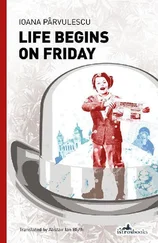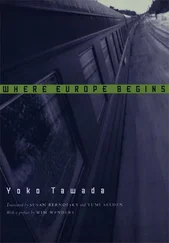She had spent the morning with him at his desk, lifting his heavy arms and legs, saying, Contract, Walter, do it yourself, contract your muscles, and Walter wasn’t able to complete even one coordinated movement. Should we stop? But he had shaken his head, apparently wanting to go on, to endure it, this sweaty work together in the middle of the living room in the oppressive heat, in front of the television, in front of the animated cartoons, as if the odd movements of the cartoon figures were more like Walter’s own movements than any single movement in real life.
Stella leans forward and taps on the glass divider; the driver turns around and opens the glass a crack, a prison guard would do it no differently.
Do you have any idea, Stella says not concentrating; I mean, can you estimate how long we’ll have to stand here like this; because if it’s going to be a long time, we would get out. She knows she sounds like a wilful child.
Freedom. The freedom to get out of a car.
If I knew stuff like that, the driver says, I wouldn’t be sitting here. I’d be somewhere else, somewhere completely different, and he leaves it at this arbitrary answer, shuts the divider, turns away.
I’m going to be leaving, Walter, Stella says. She crumples the damp cloth in her lap. I wanted you to know. I’m going to stop working for Paloma; we’re moving. I’ll still be here till the end of the month; then I’ll hand in my notice; I’m not sure when Paloma can let me go. I’ll still be here when you come back from the hospital. In any case. But later on I’ll have to leave.
She talks and talks. She knows that she’s talking like this because Walter won’t be saying anything in reply. Can’t say anything about it and can’t ask any questions; he can only alternate between syllables, between sounds that can be understood one way or another, depending, depending on what Stella wants to hear.
*
Dermot says, What did you eat today?
What did I eat today, Stella says. She has to think about it for a moment, then she remembers — lettuce. I ate lettuce and bread and the last cold pancake that Ava couldn’t manage to eat yesterday. And you?
A little bit of soup, Dermot says absent-mindedly. It’s actually too hot to eat, isn’t it. But one has to eat. One has to eat something.
Why did you ask what I ate, Stella asks in all seriousness.
Sometimes that can be a distraction, Dermot says, and he smiles as if she’d caught him at something.
They’re standing together in Dermot’s garden. Julia is in the hospital. She’d got up during the night, had sat down in the kitchen, waiting for a sign, and had finally left the house at dawn; she fell just outside the house, and Dermot found her on the front stairs. She was dressed as if for a Sunday church service or for a concert; blood was coming out of her ears. Where did she get the strength to do this, and why didn’t Dermot hear her; why didn’t he hear her get up. How is that possible. Stella thinks that in a certain way Julia walked out of the picture. Walked out for good; a move she had begun by the sea in March forty years ago and had now completed.
It seems, Dermot says casually, that we’ll be packing our things at the same time. You and I. Our, how do you say it — our trash. He looks at Stella, his face is too familiar for her to be able to tell how sad he is. His friendliness seems to have faded, warmth diminishing, withdrawing. Stella thinks she can understand that.
He jerks his large head as if he wanted to keep her from such thoughts. He says, Do you already know what you want to do?
No, Stella says. She has to smile; it’s embarrassing not to know what she wants to do. She says, The sort of work I do I can do anywhere, can’t I. I mean, there are people everywhere like you, like Julia, like Esther. There are people everywhere like Paloma. But perhaps I’ll do something completely different. Let’s wait and see?
Yes. You’ll see, Dermot says. He sounds matter-of-fact. Change releases energy, an energy you perhaps don’t even know of yet.
Stella thinks, But that also applies to you then. Does that also apply to you? Will Julia’s death release an energy in you which you don’t have any inkling of now; what energy is that supposed to be.
She can’t imagine. She stands next to Dermot, and they watch the wind blow through the tarpaulins outside the house. The tarps ripple in a wave-like motion like water, reflecting the light.
At midday, after Jason’s departure, Mister Pfister puts a yellow slip of paper into the mailbox.
Stella sees him coming from the bedroom — she is straightening up the bureau, sorting Jason’s shirts, extending his presence that way; she doesn’t want to lose touch — she sees Mister Pfister walking down the street, hoodie top, dark trousers, swollen face, left hand in his trouser pocket; he stuffs what he has in his right hand directly into the mailbox. Then he presses the bell, looking up towards the bedroom, leaving his thumb on the bell while looking up.
Stella, upstairs in the bedroom, looks down at him. The bell shrills. She stands at the open window with Jason’s shirts in her arms looking down at Mister Pfister; he stands, as if framed by the window, the mullein on the left, the edge of the forest on the right, what a picture. Then the bell stops ringing. Mister Pfister turns and walks back home.
*
Stella finishes sorting the laundry. She makes the bed, partially closes the window. In the kitchen she puts the breakfast dishes into the sink and shakes the tea leaves out of the teapot; she neatly folds up the newspaper Jason read that morning, looking for a while at the photo above the headline: three Chinese astronauts who have landed on a desolate landscape. Carefully she wipes off the kitchen table, just can’t stop wiping the kitchen table. She goes into the hall and lets down her hair in front of the mirror, combing it and pinning it together again. She pinches her cheeks, the way Clara always used to. Clara always did that. She puts on her jacket, locks the front door behind her, and unlocks the mailbox.
*
Hello, so what does it feel like to be stalked
*
Stella closes the mailbox without touching the piece of paper. She leaves the garden and walks out into the warm day, turning left down the street, in Mister Pfister’s violently vibrating tracks. The house of the female student, that of the Asian family, that of the old woman, her deserted garden, the pruned rhododendron, a garden umbrella at the edge of the field, open above an overturned chair. The fallow land of the empty lot, poplar pollen in the gutter, dandelions, then the pool, the terrace where a man sitting in the shade turns disinterestedly to watch Stella, and at last the familiar, fairy-tale house of the bicycle mechanic, a house made of glass, the smell of which Stella knows once and for all — linen and curd soap and mint; she knows how the light falls onto the tiles in the room under the roof and that there are things standing on the stairs for which no place has yet been found, a wooden coffee grinder, juice glasses, film spools; she knows that there’s a picture of a dog hanging on the wall between the living room and the kitchen and that the bicycle mechanic prefers green army jackets — his house is quiet. The two folding chairs lean against the wall, and the first of the bicycles next to the door is still hers.
Stella looks at the place in passing. She doesn’t stop, doesn’t really slow down; she arrives in front of Mister Pfister’s house, locked gate and black windowpanes, nothing in the garden that would say anything about Mister Pfister, no twist in the plot.
Stella rings.
She can hear the bell shrilling inside the house, a bell like her own; still, it sounds different, a bit muted, muffled. She realises with surprise that Mister Pfister has actually got her to do exactly what he usually does — ringing the bell at a house where they don’t want to open the door for her. Pressing her finger down hard on a bell in anger and fury and thinking, I know you’re there.
Читать дальше












